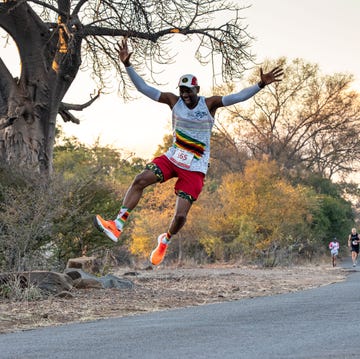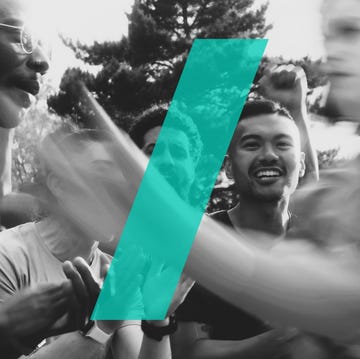If someone you know has just run a big race like a marathon, your first question might be this: ‘What was your time?’ This is a very normal response, as a race is almost always measured by the clock. Plus, everyone knows how fast the quickest runners can complete a distance – and those top-level times can serve as a reference point by which runners and non-runners alike can gauge other performances.
However, some people in the running world also subscribes to certain benchmarks – whether that’s breaking four hours for the marathon or achieving a Boston Marathon qualifying time – and that can create a ‘good time versus bad time’ mentality. As such, if you were faster than ‘X’ time, your performance was ‘good’ – and if you were slower than ‘Y’ time, your performance was ‘bad’.
That way of thinking can limit the way that we experience running. According to a meta-analysis published in the International Review of Sport and Exercise Psychology, fixating on outcome goals – like what the finish clock says – has a minimal effect on running performance. By contrast, concentrating on process goals – or celebrating the little victories along the way – has a much greater effect on our running performance. To put it simply, focusing on the journey instead of the end point is proven to be rewarding – and, as research suggests, it leads to better results.
What everyone's reading
So, instead of asking people what time they scored in a race, ask them how the race went. This gives them the space and opportunity to answer in a way that celebrates the things that made them proud of their performance. Perhaps they found a strong finishing kick or ran negative splits, or they took fewer walking breaks than expected, or they stuck to their mid-race nutrition plan and finished with a smile on their face.
For some runners, of course, the time on the clock does matter and their finish time may be the first answer they give when asked how their race went – and that’s great. But there are so many other ways to measure success in a marathon. Not all runners are motivated by the clock and not all runners do the sport to meet arbitrary time goals.
One runner may happily report, ‘I ran my fastest race yet’, without feeling the need to mention their chip time. Another person who crossed the finish line next to them may say, ‘It was a really tough day, but I’m proud of myself for getting through it’.
The point is, a more open-ended question makes it about the runner and their unique experience, rather than the numbers on the clock. It’s not that finish times don’t matter, or that runners shouldn’t have time goals – it’s about recognising that runners can define success differently and that, regardless of time, finishing a race will always be a great accomplishment.
Being a little more thoughtful about how we talk to each other is how we can continue to create a more inclusive running community. This is especially the case now, with increasingly more people of all backgrounds and abilities taking up running and learning to love all the benefits that it brings.













